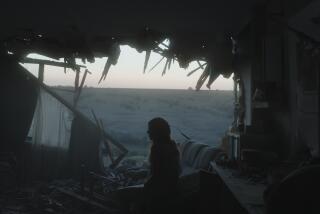Survival, and then what?
- Share via
Wars seldom end when a peace accord is signed, and that is especially true of the conflict in what survivors still call “ex-Yugoslavia.” Because what combatants did was so savage, and because enemies, especially in the city of Sarajevo, had been so close, the war is a wound that has difficulty healing, a nightmare that even daylight can’t dispel.
While excellent films like Danis Tanovic’s Oscar-winning “No Man’s Land” and Vinko Bresan’s “Witnesses” have dealt with the war itself, few have dealt with the aftermath, and none with the aching power and empathy of “Grbavica: The Land of My Dreams.”
The surprise winner of the Berlin Film Festival’s Golden Bear last year, beating out such big names as “Syriana” and Terence Malick’s “The New World,” “Grbavica” is a disquieting, all too plausible film, simultaneously heartbreaking and hopeful, about the human need for connection and the difficulties that get in the way.
Written and directed by Jasmila Zbanic, a survivor of Sarajevo’s 46-month siege, “Grbavica” is named after one of that city’s neighborhoods. It’s an area where Bosnians were tortured during the war, a neighborhood that is trying, like Esma (the veteran Mirjana Karanovic) who lives there, to return to a semblance of normal life.
“Grbavica” opens with Esma in two different times with wildly different music on the soundtrack. We see her first during the war, with a roomful of other women, as a haunting, dirge-like traditional melody is heard. Then the scene abruptly shifts to today and the driving, hedonistic sound known as turbo folk as an older Esma applies for a job waitressing in a bar, assuring the owner that she has no children.
This, we immediately learn, is a lie. Esma is a single parent who lives with her 12-year-old daughter Sara (newcomer Luna Mijovic). The girl’s father, Esma says, was a shaheed, someone who died fighting for Bosnia. His body has never been found, a not-unusual situation.
Esma sought out the waitress job because the stipend she gets from the state plus her freelance work as a seamstress do not cover expenses for her growing child. The current fiscal need is for an expensive school trip that Sara is desperate to go on.
Though mother and daughter clearly have a strong relationship, that situation is threatening to change. Sara is starting to exhibit the classic headstrong teenage attitude and, when she meets a boy she likes whose father was also a shaheed, wants to know more and more about her own father.
As for Esma, she is trying to hold herself and her small family together emotionally as well as fiscally while also dealing with the unnerving complication of Pelda (Leon Lucev), a potential new man in her life who lives in the neighborhood and works in the same bar.
In another country in another world, these might be everyday situations, but in postwar Sarajevo, despite its veneer of normalcy, nothing is everyday. This is a place where Esma and Pelda bond over the shared experience of postmortem corpse identification, a city where emotions like “only fools have children these days” and “If I remembered everything, I’d kill myself” express the true tenor of the times.
Yet, despite all the obstacles, one of the things “Grbavica” is trying to say is that everyone has a yearning for belonging, for emotional connection and, even if they don’t always acknowledge or realize it, for the confronting and discussion of the truth of the past, without which none of their hopes will be possible.
Perhaps because she lived through the war, writer-director Zbanic’s empathy with her characters’ situations couldn’t be more intense. No matter how strong the emotions get, they never feel laid on, never feel less than believable.
In this the filmmaker is helped by the excellent performances of her entire cast, but especially of star Karanovic, known to audiences worldwide through her starring roles in several of Emir Kustrica’s films, including “When Father Was Away on Business” and “Underground.”
Karanovic was a best actress nominee in the European Film Awards for this role and it is clear why. She has a face that is open to emotion, that draws us in, making us feel all that her character does. Because of this performance and the others, “Grbavica” is a film we watch with our heart in our mouth, wondering when, if ever, the war will end for those who lived through it and, at least physically, survived.
“Grbavica: The Land of My Dreams.” Unrated. Running time: 1 hour, 25 minutes. Exclusively at Laemmle’s Music Hall, 9036 Wilshire Blvd., Beverly Hills (310) 274-6869; Playhouse, 673 E. Colorado Blvd., Pasadena (626) 844-6500.
More to Read
Only good movies
Get the Indie Focus newsletter, Mark Olsen's weekly guide to the world of cinema.
You may occasionally receive promotional content from the Los Angeles Times.










